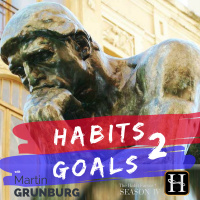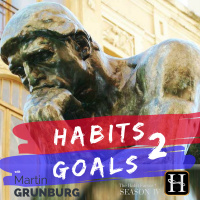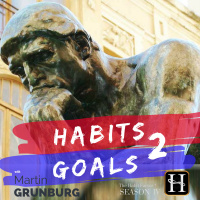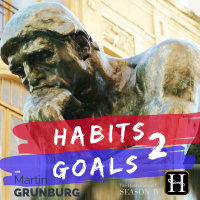Sinopsis
If youve ever struggled to achieve your goals you are not alone! The reason just might be because ALL prior goal achievement methods missed ONE key element H A B I T! That's right, The Habit Factor® (bestselling book and app) exposed a timeless truth that helped to launch an entirely new genre of productivity apps (habit trackers) and help thousands around the world achieve their goals faster!Theres a reason top coaches, consultants, trainers, Professional athletes, Olympians, PhDs and the very best learning institutions world-wide have adopted and recommend The Habit Factor®.This is your chance to learn and apply The Habit Factor's insights and specific goal achievement methodology (plus, habit alignment technology) to achieve your biggest and most important goals faster than you ever thought possible! Check it out learn more at: http://thehabitfactor.comLook for our series: Step-by-step: How to Make 2018 a Breakthrough Year!
Episodios
-
S620: Kevin Daum
06/11/2019 Duración: 52min"As a businessman and a human, I have every opportunity to start fresh, take advantage of new opportunities, and to attack life with renewed vigor.” ~Kevin Daum Habits2Goals is delighted to welcome media strategist, serial entrepreneur, theater arts champion, and bestselling author Kevin Daum. Kevin’s marketing approach as an Inc. 500 entrepreneur delivered more than $1 billion in sales. As a serial entrepreneur, he built several companies and now leads an experienced team of Gazelles International coaches who help fast-growth companies apply Scaling Up principles. Kevin is also a contributing editor for the YPO global leadership community and garners several hundred thousand monthly views for his column on Inc.com. He is a consistently high-rated speaker. Kevin is a champion for liberal arts education and has facilitated unique arts-based learning programs for Fortune 500 companies. Listen in to learn about Kevin's entrepreneurial journey, how to strategically plan to create a personal awesome future, and
-
S619: Culture
04/11/2019 Duración: 19min"Shaping your own personal culture means identifying your values and crafting an environment that is aligned to those values." This Monday brings a massive mind bullet that brings up a new topic for Habits2Goals: culture. This mind bullet was inspired by a Monday Night Football broadcast where the New England Patriots destroyed the New York Jets. The game was so boring the announcers had to fill the time with a history of the Patriots' greatness and how the team's culture played a huge role. Values and culture are interwoven; business leaders who get this tend to have amazing organizations, and the Patriots are a great example. Their culture is articulated at the very entrance of the players' locker room on a sign that reads: Do Your Job Team First Work Hard Be Attentive Upon exit, another sign reads: Don't Believe the Hype Speak for Yourself Ignore the Noise Manage Expectations This is a great reminder to take a few minutes to articulate your values, which guide your thinking, affect your behavior, and
-
S618: Knowledge vs. Wisdom
01/11/2019 Duración: 15min"Knowledge is knowing tomato is a fruit; wisdom is not putting it into a fruit salad.” ~Miles Kington On this Frequently Asked Friday, we tackle the age-old question: What's the difference between knowledge and wisdom? Earlier this season we tackled wisdom as a standalone topic. This time, though, a LinkedIn post inspires Martin to revisit the question and review some of the common myths and misunderstandings. A key distinction is that wisdom—much like principles—does not waiver. The wisdom of thousands of years ago is as true today as it was then. Knowledge, on the other hand, is not static; it changes from one day to the next. Eggs are bad for you, then they are good for you. There were nine planets in our solar system, now there are eight. Knowledge is backward-looking and evolves over time. In fact, understanding that knowledge is backward-looking inspired one of the most knowledgeable people ever, Albert Einstein, to proclaim, "imagination is more important than knowledge." Listen in to learn more about
-
S617: Goal-Setting 201
30/10/2019 Duración: 45min"If Artificial Intelligence (AI) is goal-directed behavior, then setting meaningful and worthwhile goals is a true sign of real intelligence." Henry J. Evans joins Habits2Goals to pick up where last week's episode, Goal-Setting 101, left off, continuing our discussion of the massive topic of goal-setting. Last week we discussed the what, why, and how of goal-setting, among other things learning why SMART goals aren't smart, how to become the best version yourself that you can imagine, how to stay motivated, and how habits and tracking are game-changers when you're creating your own vision of yourself. This week, we look at the importance of setting goals, managing the inevitable setbacks that come with goal setting, how accountability plays a role, and why tracking habits is the magic secret sauce in goal achievement. Listen in to hear more on why goal-directed behavior is the very definition of intelligence, why goals are mostly about your capacity to set the goal and go after it, how tracking is key, and
-
S616: Shut Up!
28/10/2019 Duración: 13min"If everything is energy—and it is—what do you think happens when you flap your gums?" Today's Mind Bullet is a bit brutal but necessary: Shut Your Freaking Mouth! In other words, silence. We talked about this idea in a blog post called "Shut Your Pie Hole," discussing oversharing as a personal development hurdle, and it is eloquently explained in this TED Talk: Derek Sivers, Keep Your Goals to Yourself. This MBM was sparked by a Facebook post by someone who continually complains. When good things happen, such as finally getting a new job, there's yet more griping and rambling about downsides, even on day one. Their story is on repeat; it's habitual complaining. Where's the gratitude? Where's the personal responsibility? So shut up! It's not just about constant complainers. We lose focus and dissipate our energy every time we mindlessly overshare, especially when it comes to goals. Sometimes it seems like everyone needs to tweet or express publicly whatever sound bite is in their head. Keeping quiet and
-
S615: Where Can I Find Hope?
25/10/2019 Duración: 15min"Where there is hope in the future, there is happiness in the present.” On this Frequently Asked Friday, we tackle the question: Where can I find hope? In our recent How Can I Stay Motivated? episode, we discussed failure as a stepping stone to success, not the opposite of success. In fact, the opposite of success might be hopelessness, because, without hope, there's no opportunity to create our ideal future. Temporary feelings of hopelessness and sadness are normal, but persistent hopelessness is dangerous. Hope means there's opportunity in the future, and since no one knows what the future truly holds, we are free to use hope to craft and believe in a better future. While creating a great future takes vision, goals, faith, and belief, it all begins with an understanding of hope. Where there is hope in the future, there is happiness in the present. Listen in for more on holding onto hope; using a hopeful future to drive today's happiness; and how to manufacture hope through goals, heroes, and even books. En
-
S614: Goal Setting 101
23/10/2019 Duración: 47min"Success is the progressive realization of a worthy goal or ideal.” ~Earl Nightingale Today's episode brings back legendary former co-host Henry J. Evans—a dynamic marketing expert, best-selling author, speaker, and consultant—for an important introduction to goal-setting. Habits2Goals exists to help listeners learn to set and achieve goals, supported by habits, and live life to their full potential. But it's important to take it back to the beginning for a refresher on just HOW to set goals in the first place—and why it's so critical. Goals can be as broad as your overall life purpose or as minute as what you're doing right now, today, and setting goals requires an understanding of your own values. The first step, as MG calls it, is "beginning with the end in mind." Project yourself 5, 10, 20 years down the road. Who is that person? What habits do they have? Are you proud to be this person? What do you want to be like and how do you want to be? Then you can go about building that person from the ground up. N
-
S613: Belonging
21/10/2019 Duración: 11min"I long, as does every human being, to be at home wherever I find myself." Maya Angelou Today's Mind Bullet once again digs into the root of a word to find more understanding. This time, we look at the word belonging. A Facebook post is the genesis of this episode. A friend shared a post on a military veteran's experience of belonging and how finding that sense of belonging post-service was a difficult search. The first definition of "belong" is to possess something. The second is to be a member or part of a particular group. Think about that first definition when you find yourself searching for that sense of belonging. Perhaps that journey should start inside and become something you possess rather than something you seek. Listen in to hear more about the idea of belonging, possessing an internal sense of belonging before trying to find it outside, and how belonging, just like everything else, begins with you. *** New listeners: By texting the word "HABITS" to the mobile phone number "33444" you will inst
-
S612: What Are the Keys to Happiness?
18/10/2019 Duración: 16min"There is no way to happiness; happiness is the way.” ~Buddha On this Frequently Asked Friday we tackle the massive idea of happiness once again. In season 4 we addressed the topic "How Can I Be Happy?" toward people fighting through depression and sadness. Today, however, we explore the question, "What Are the Keys to Happiness?" A paradigm-shifting concept is simply to choose happiness. The idea of happiness as a choice goes back thousands of years, and yet too many of us expect perfect circumstances to bring us happiness. To achieve happiness, your basic circumstantial needs (food, shelter) must be met. Taking care of our bodies is vital, as our energy relies on health and wellness. Optimizing your environment influences your happiness. Surround yourself with positivity to set yourself up for success at choosing happiness. Importantly, goal achievement via habit tracking—along with the right mindset—is a critical element of happiness. Listen in for more on about making happiness a choice, setting yourself
-
S611: Paul Reynolds
16/10/2019 Duración: 42min"Put yourself in the shoes of others and make it part of your core values; it's the basis of customer-centered ideology.” ~Paul Reynolds This week's Habits2Goals interview spotlights a phenomenal CEO and entrepreneur, Paul Reynolds, whose business insights come fast and furious. Paul is a lifelong entrepreneur and the CEO of EasiHair Pro, a leader in the hair extension industry that utilizes a revolutionary tape-in method. Growing up in Capetown, South Africa, with an entrepreneurial father, Paul learned the value of both hard work and taking time to enjoy life. He immigrated to the U.S. with his family, attended San Diego State University, and dreamed of owning his own business. His father steered him toward an accounting career to prepare him for the rigors and challenges of entrepreneurship, and while he enjoyed the work, he yearned for the freedom of working for himself. He figured out that "niches bring riches" and was inspired by his father's wig business to found EasiHair. Wigs were a niche, and hair e
-
S610: Lost
14/10/2019 Duración: 10min"Being 'lost' isn't as much about not knowing where you are as much as it is about knowing where you want to go." Today's Mind Bullet stems from a reader's feedback, appreciating the way we dig into the etymology of a word to extract its true meaning and look at it in a new light. We did this with our Quest episode, and today we put the spotlight on the word lost. First, why do we do this? A Zen quote says, "To the beginner all things are possible, and to the expert few things are possible." When we keep a growth mindset—a beginner's mind—we find ourselves always open to learning. Too often we close ourselves off to learning with our preconceived notions. Take the word lost. The definition of lost is, "Unable to find one's way; not knowing one's whereabouts." We usually default to the second understanding of lost—not knowing one's whereabouts. But the first part of the definition is critical when we're trying to move on from our own feelings of being lost. We've all said it and felt it: "I feel lost." But i
-
S609: How Can I Stay Motivated After Failure?
11/10/2019 Duración: 11min"Many of life's failures are people who did not realize how close they were to success when they gave up.” ~Thomas Edison Today's Frequently Asked Friday is deceptively straightforward: How can you stay motivated after repeated failures? First, let's get a "right perspective" on failure. Is failure the opposite of success? Absolutely not! Anyone who has ever succeeded has failed along the way. Think about Thomas Edison and his fabled 10,000 failures before he refined and invented the lightbulb. Was he wondering how to stay motivated? No! Every time he failed, he felt one step closer to success. Whether in business or any area of life, "failure" isn't the opposite of success. Failure means energy and effort was put toward a goal, so the experience is valuable. The real danger is hopelessness. But what about motivation? Think about your motive. As Tony Robbins said, "If you have a big enough why, you can always find the how." Listen in to hear about using failure as a stepping stone to success, figuring out if
-
S608: Shay Eskew
09/10/2019 Duración: 52min"I learned early on that I couldn’t control what happened to me, but I could control what I did about it.” ~Shay Eskew Habits2Goals is proud to present a powerful interview with best-selling author, motivational speaker, Ironman, and fellow Rim-to-Rim-to-Rim adventurer Shay Eskew. Shay's story is inspiring and motivating, showing that self-made success is possible despite overwhelming obstacles. At the age of 8, a neighbor's child accidentally set Shay on fire. Shay saved the life of his 7-year-old friend and suffered burns on more than 65 percent of his body. Despite being told he'd never play sports again—and enduring more than 35 surgeries over the last 36 years—Shay is a four-time Ironman, member of Team USA, and 25-time Ironman 70.3 athlete. He is ranked in the top 1 percent of Ironman athletes worldwide and has competed in 11 Triathlon World Championships in seven countries on four continents. Shay shares his gut-wrenching fight to rise above his injuries and reclaim his life, and how he rose above
-
S607: The 10,000 Hour Rule
07/10/2019 Duración: 11min"Practice isn't the thing you do once you're good. It's the thing you do that makes you good." ~Malcolm Gladwell Today's Mind Bullet revolves around a famous success tenet that, when you look deeper, simply reflects the magic of The Habit Factor: The 10,000-hour rule. The 10,000-hour rule was made famous in Malcolm Gladwell's book Outliers, which discusses the outlier-type variables that influence success, for example when you were born. 10,000 hours spent practicing a skill. This rings a bell. What is created when you do something over and over again until you become unconsciously proficient? That's right! A habit! In Outliers, while Gladwell points out the seemingly random occurrences that contribute to success, he discusses one consistent success factor that holds true across all instances: the 10,000 rule. That is, practicing a specific task that can be accomplished with 20 hours of work a week for 10 years, leading to otherworldly proficiency. Tune in for more on Gladwell's 10,000-hour rule, the one gr
-
S606: How Long To Develop a Good Habit?
04/10/2019 Duración: 18min"Good habits happen when planned; bad habits happen on their own." ~Grunburg This Frequently Asked Friday throws it back to a core concept: How long does it take to develop a good habit? (For more on this topic, check out Season 4's What Is Habitstrength? and What's the Best Way to Build a Good Habit?, and Season 2's How Long Does it Really Take to Build a Good Habit?) Building a good habit DOESN'T take a week, or 14 days, or the mythical 21 days some like to tout. The 21-day myth, in particular, gained traction thanks to its inclusion in Psycho-Cybernetics, by Dr. Maxwell Maltz, who said, "It usually requires a minimum of about 21 days to effect any perceptible change in a mental image.” Newer research actually points to 66 days to create a habit, but even this isn't a fixed number. What's critical is hitting all three major components to building a habit (according to Stephen Covey in his 7 Habits of Highly Successful People): desire, knowledge, skill—or as we've tweaked the formula, the capacity to do the
-
S605: David Rendall
02/10/2019 Duración: 01h06min"What makes us weird also makes us wonderful. What makes us weak also makes us strong." ~David Rendall Habits2Goals is proud to welcome a true "freak," professional speaker, bestselling author, Ph.D., and fellow Rim-to-Rim-to-Rim adventurer David Rendall. Growing up, David was told he’d never be successful because he didn’t fit the mold— he couldn’t sit still, he talked too much, and he didn’t listen. He tried to conform to the norm and even pursued a career in counseling psychology. But he ended up unhappy, unsuccessful, and never actually worked in his "chosen" field. Known as "the Freak," David realized that his supposed flaws were actually strengths. Even the term "freak" has two meanings — someone who is different and perceived in a negative light, or someone who is different and admired (think Giannis Antetokounmpo, the "Greek Freak"). The kid who was criticized for talking too much now speaks for a living, teaching revelatory management practices to get the most out of employees by embracing their un
-
S604: Quest
30/09/2019 Duración: 19min"Well I'll tell you something, this is no longer a vacation, it's a quest. It's a quest for fun, I'm gonna have fun and you're gonna have fun, we're all gonna have so much ****ing fun..." Clark Griswold This Mind Bullet, Quest, was inspired by two things: a listener, Micheal K., who wrote in suggesting an episode about questions, and Chevy Chase's iconic Clark Griswold character from the Vacation movies. A little background: Emotionally keyed up and on the edge of sanity after a series of mishaps on his family's way to Wally World, Clark announces that the family trip is no longer a vacation—it's a quest for fun. He goes on to announce that they'll have so much fun they'll need plastic surgery to remove their grins, among other things. (Warning: Clip is played in unedited form, complete with F words.) Quest is at the root of the word question, and quest and question are all part of the same process. We are all on a quest in our lives, and asking the right questions is the key. Asking questions cues our mind
-
S603: How to Kill a Bad Habit
27/09/2019 Duración: 11min"A nail is driven out by another nail. Habit is overcome by habit.” ~Desiderius Erasmus On the first Frequently Asked Friday of Habits2Goals Season 6, we tackle a back-to-basics topic first visited in Season 1: How to kill a bad habit. The formula is simple: To kill a bad habit, use the three "ments": environment, replacement, and experiment. Say you need to kill the bad habit of drinking beer. To control your environment and make it conducive to quitting this habit, don't buy beer. Need to quit smoking? Don't buy cigarettes or be around those who smoke. The bottom line: If your environment is conducive to a bad habit, that bad habit isn't going anywhere. Create impediments to create a prohibitive environment! Substitute comes next: If you're quitting beer, perhaps substitute it with non-alcoholic beer. If your habit is smoking, go for a walk when your friends go out for a smoke. Remember that just as a nail is driven out by another nail, habit is driven out by another habit. Next, experiment: Nothing in li
-
S602: Michel Kripalani
25/09/2019 Duración: 01h04s"Life is full of opportunity. Leadership is about taking those opportunities. Legacy is what you will leave behind when you do." ~Michel Kripalani Habits2Goals is proud to present a conversation with the insightful leader, coach, and entrepreneur extraordinaire Michel Kripalani A peripatetic upbringing with an engineer father exposed Kripalani to numerous life experiences, fueling a fascination with and empathy for people and their varied life experiences. At first a pre-med student at UCSD, Kripalani found himself called to visual arts; this path led to his first startup soon after graduation, moov Design, a firm ahead of its time that coded the first-ever multimedia magazine. Fueled by a desire to build a game, his next venture, Presto Studios, created the Journeyman Project in 1993—the world's first photorealistic adventure game. JP defied all expectations, selling more than 100,000 copies. A desire to enter the burgeoning app economy fueled Kripalani's next venture: Oceanhouse Media, which became a lea
-
S601: Your Future Self
23/09/2019 Duración: 11min"We tend to believe that in the future, we're much, much better." "You can't build a reputation on what you are going to do." Henry Ford Habits2Goals kicks off its sixth season with a powerful Mind Bullet: Your Future Self. A topic called "behavioral economics" was the catalyst for this mind bullet. In his book The Undoing Project, author Michael Lewis discussed the concept of behavioral economics—the idea that humans are not rational creatures. They're emotional. Sometimes they eat too much, sometimes they drink too much, etc. The concept of behavioral economics cropped up again in an NPR podcast featuring Richard Thaler, who won a Nobel Prize for behavioral economics and is the author of Misbehaving: The Making of Behavioral Economics. Thaler said something that resonated: "We are all better in our future self." Think about it: Our future self is amazing! We say things like, "I'm going to get her flowers next week." "When I get my raise, I'm going to save more money." I'm going to eat better, give more, sa





























